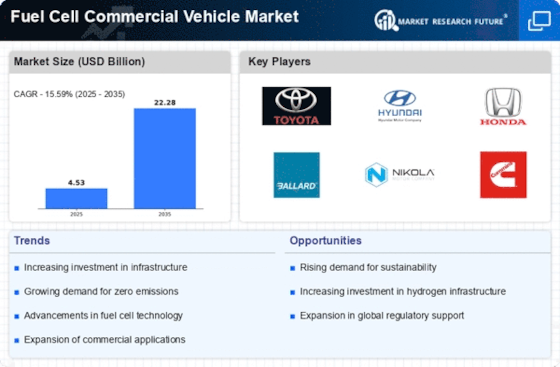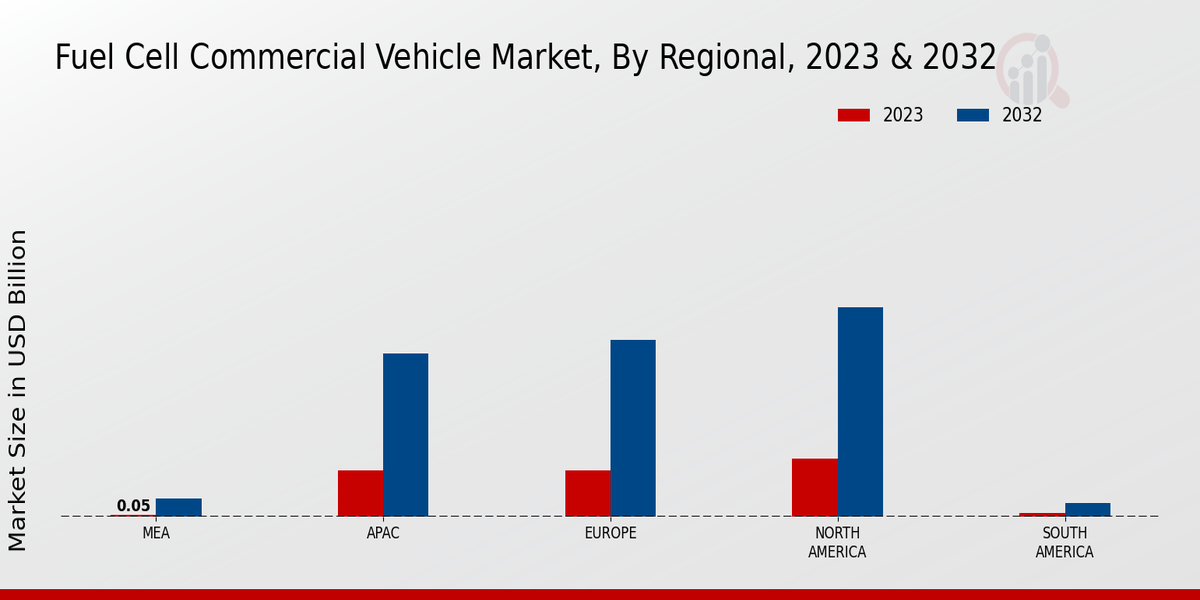Market Growth Projections
The Global Fuel Cell Commercial Vehicle Market Industry is projected to experience substantial growth in the coming years. With a market value of 3.92 USD Billion in 2024, it is expected to reach 19.3 USD Billion by 2035, indicating a robust compound annual growth rate of 15.6% from 2025 to 2035. This growth trajectory reflects the increasing adoption of fuel cell technology across various commercial applications, driven by environmental regulations, technological advancements, and consumer demand for sustainable solutions. The market's expansion is indicative of a broader shift towards cleaner transportation options in the global economy.
Expansion of Hydrogen Infrastructure
The expansion of hydrogen infrastructure is critical for the success of the Global Fuel Cell Commercial Vehicle Market Industry. The establishment of refueling stations and distribution networks is essential to support the growing number of fuel cell vehicles on the road. Governments and private entities are investing in hydrogen infrastructure development, which is vital for ensuring the availability of hydrogen fuel. This infrastructure growth is likely to enhance consumer confidence in fuel cell technology, thereby accelerating market adoption. As more refueling stations become operational, the convenience and practicality of fuel cell commercial vehicles will improve, further driving market growth.
Increasing Environmental Regulations
The Global Fuel Cell Commercial Vehicle Market Industry is experiencing a surge in demand due to stringent environmental regulations aimed at reducing greenhouse gas emissions. Governments worldwide are implementing policies that promote the adoption of zero-emission vehicles, including fuel cell commercial vehicles. For instance, the European Union has set ambitious targets for reducing carbon emissions, which encourages manufacturers to invest in cleaner technologies. This regulatory landscape is likely to drive the market's growth, as companies seek to comply with these regulations while also meeting consumer demand for sustainable transportation solutions.
Government Incentives and Funding Programs
Government incentives and funding programs are playing a pivotal role in the expansion of the Global Fuel Cell Commercial Vehicle Market Industry. Many countries are offering financial support, tax credits, and grants to encourage the development and adoption of fuel cell technologies. For instance, the U.S. Department of Energy has initiated programs aimed at promoting hydrogen fuel cell research and infrastructure development. Such initiatives not only lower the financial barriers for manufacturers but also stimulate consumer interest in fuel cell commercial vehicles. As these programs gain traction, they are expected to significantly contribute to market growth.
Technological Advancements in Fuel Cell Technology
Technological advancements in fuel cell technology are propelling the Global Fuel Cell Commercial Vehicle Market Industry forward. Innovations in fuel cell efficiency, durability, and cost reduction are making these vehicles more attractive to fleet operators. For example, improvements in hydrogen storage systems and fuel cell stack designs have enhanced vehicle performance and range. As a result, the market is projected to grow from 3.92 USD Billion in 2024 to an estimated 19.3 USD Billion by 2035, reflecting a compound annual growth rate of 15.6% from 2025 to 2035. These advancements are crucial for increasing the adoption of fuel cell commercial vehicles.
Growing Demand for Sustainable Transportation Solutions
The Global Fuel Cell Commercial Vehicle Market Industry is witnessing a growing demand for sustainable transportation solutions as businesses and consumers become increasingly environmentally conscious. Companies are seeking to reduce their carbon footprints and enhance their corporate social responsibility profiles. Fuel cell vehicles offer a viable alternative to traditional diesel-powered trucks, providing longer ranges and quicker refueling times. This shift is evident in various sectors, including logistics and public transportation, where organizations are transitioning to cleaner fleets. The increasing emphasis on sustainability is likely to further drive the adoption of fuel cell technology in commercial vehicles.























